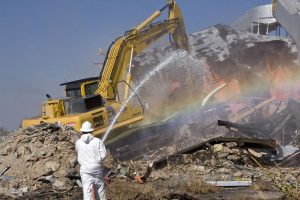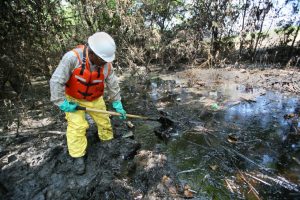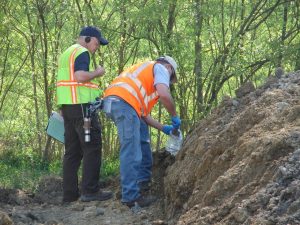 The Massachusetts Department of Environmental Protection (MassDEP) has announced a new online data management system for Underground Storage Tank (UST) registrations and third-party inspections (TPIs). As of August 1, 2015, MassDEP will no longer accept paper UST forms FP-290, FP-290R and FP-289 and will instead require all registrations and inspections to be filed electronically.
The Massachusetts Department of Environmental Protection (MassDEP) has announced a new online data management system for Underground Storage Tank (UST) registrations and third-party inspections (TPIs). As of August 1, 2015, MassDEP will no longer accept paper UST forms FP-290, FP-290R and FP-289 and will instead require all registrations and inspections to be filed electronically.
In preparation for the new requirement, MassDEP will be offering a webinar on “Data Management System Training for UST Owners, Operators, and Third-Party Inspectors” beginning on July 15. In addition, they will be offering hands-on training sessions for UST system owners, operators, and staff responsible for preparing and/or submitting UST registration documents, TPI reports, and compliance certifications. These training sessions, which require advance registration, will be offered in Fall River, Holyoke, Worcester, and Danvers. For your convenience, the original MassDEP press release is copied below in its entirety.
If you have any questions or require assistance with TPIs or compliance certifications, please contact Jonathan O’Brien, LSP, LEP at 508-386-9338 or jobrien@tataandhoward.com.
Original letter from MassDEP:
Dear Class A, A/B and B Operators and Third-Party Inspectors:
Beginning in July, MassDEP is transitioning from the current paper based Underground Storage Tank (UST) Program registration and reporting forms (FP-290, FP-290R and FP-289), to a new online data management system that provides UST system owners and operators a more convenient, electronic way to update facility registration information and submit applicable reporting documents.
The new data management system will be available for user registration by mid-July. MassDEP will notify all Class A, A/B and B operators and third-party inspectors when the data management system is ready for use.
UST Program Reporting Transition Schedule
- Effective July 31, 2015, MassDEP will no longer accept FP-290, FP-290R and FP-289 documents for purposes of compliance with UST registration and third-party inspection reporting requirements under 310 CMR 80.00.
- Effective August 1, 2015:
- All new and updated UST registration submittals shall be made electronically through MassDEP’s new online UST data management system. Registration information may be submitted as a paper document, if accompanied by a hardship request.
- All third-party inspection results shall be reported electronically by third-party inspectors using the new Third-Party Inspection (TPI) Report provided through the new online data management system. The third-party inspector will then electronically forward the TPI Report to the UST system owner or operator for signature and submittal to MassDEP.
Compliance with Third-Party Inspection Reporting Requirements
To provide UST system owners, operators and third-party inspectors time to register as users in the data management system and become familiar with the system and new Program requirements, TPI Reports due between August 1, 2015 and October 31, 2015 will be allowed up to October 31, 2015 to submit their required TPI Report using the new online data management system.
All TPI Reports for this period received after October 31, 2015 may be subject to enforcement.
Compliance Certification Submittals
The Compliance Certification submittal requirement goes into effect November 1, 2015. MassDEP will issue 90-Day Reminder notifications in July to UST system owners and operators with Compliance Certifications due in November 2015.
Data Management System Training for UST Owners, Operators, and Third-Party Inspectors
- Third-Party Inspector Online Webinar Training
Data management system overview:
- Registering as a user
- Data management system navigation
- Initiating a TPI and “sharing” a TPI Report with a UST system owner or operator.
Webinar Training Dates
No pre-registration is required to participate. Further information on webinar call-in number and conferencing service will be emailed to all TPIs prior to date of scheduled training and posted on MassDEP’s UST webpage.
- July 15, 1 – 3pm
- July 22, 1 – 3pm
- July 30, 1 – 3pm
- Aug 27, 1 – 3pm
- UST System Owners and Operators Training
This is “hands on” training for UST systems owners, operators and staff responsible for preparing and/or submitting UST registration documents, TPI Reports and Compliance Certifications.
Space is limited and available on a first come, first serve basis (system owners and operators with most imminent submittal due dates will receive priority). Additional sessions will be added as demand requires.
To reserve space, please submit your name, company, and preferred date and session to: dep.ust@state.ma.us.
| Date | July 17, 2015 | July 21, 2015 | July 27, 2015 | July 28, 2015 |
| Facility | Bristol CC | Holyoke CC | Worcester State University | North Shore CC |
| City/Town | Fall River, MA | Holyoke, MA | Worcester, MA | Danvers, MA |
| Room Capacity | 28 | 23 | 25 | 18 |
| Session #1 | 10am – Noon | 10am – Noon | 10am – Noon | 10am – Noon |
| Session #2 | 1pm – 3pm | 1pm – 3pm | 1pm – 3pm | 1pm – 3pm |
Data Management System Training Materials on MassDEP’s Webpage
The following materials will be posted on MassDEP’s UST webpage (https://www.mass.gov/eea/agencies/massdep/toxics/ust/) at the time the UST Data Management System goes “live”.
- Data Management System User Guide
- “What Do You Want To Do” Guide
- Required Data Elements of Data Management System
- Audio Power Point Presentations
- DEP Hotline #
If you have any questions concerning the introduction of the new UST online Data Management System, please email the Program at: dep.ust@state.ma.us, or call the MassDEP UST Program Hotline at (617) 556-1035 Ext. 2.
Tom DeNormandie, Branch Chief
Massachusetts Department of Environmental Protection
Underground Storage Tank/Stage I & II Vapor Recovery Programs
One Winter Street – 7th floor
Boston, MA 02108
Phone: 617-292-5763
Fax: 617-556-1063



